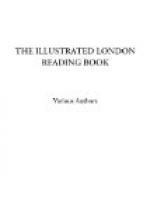[Illustration: HEAD OF THE GREYHOUND.]
* * * * *
OLD ENGLISH HOUND.
The dog we now call the Staghound appears to answer better than any other to the description given to us of the old English Hound, which was so much valued when the country was less enclosed, and the numerous and extensive forests were the harbours of the wild deer. This hound, with the harrier, were for many centuries the only hunting dogs.
[Illustration: HEAD OF THE OLD ENGLISH HOUND.]
* * * * *
SHEPHERD’S DOG.
Instinct and education combine to fit this dog for our service: the pointer will act without any great degree of instruction, and the setter will crouch; but the Sheep Dog, especially if he has the example of an older one, will, almost without the teaching of his master, become everything he could wish, and be obedient to every order, even to the slightest motion of the hand. If the shepherd’s dog be but with his master, he appears to be perfectly content, rarely mingling with his kind, and generally shunning the advances of strangers; but the moment duty calls, his eye brightens, he springs up with eagerness, and exhibits a sagacity, fidelity, and devotion rarely equalled even by man himself.
[Illustration: HEAD OF THE SHEPHERDS DOG.]
* * * * *
BULL-DOG.
Of all dogs, none surpass in obstinacy and ferocity the Bull-dog. The head is broad and thick, the lower jaw generally projects so that the under teeth advance beyond the upper, the eyes are scowling, and the whole expression calculated to inspire terror. It is remarkable for the pertinacity with which it maintains its hold of any animal it may have seized, and is, therefore, much used in the barbarous practice of bull-baiting, so common in some countries, and but lately abolished in England.
[Illustration: HEAD OF THE BULL-DOG.]
[Illustration]
* * * * *
LORD BACON.
[Illustration: Letter I.]
In those prescient views by which the genius of Lord Bacon has often anticipated the institutions and the discoveries of succeeding times, there was one important object which even his foresight does not appear to have contemplated. Lord Bacon did not foresee that the English language would one day be capable of embalming all that philosophy can discover, or poetry can invent; that his country would at length possess a national literature of its own, and that it would exult in classical compositions, which might be appreciated with the finest models of antiquity. His taste was far unequal to his invention. So little did he esteem the language of his country, that his favourite works were composed in Latin; and he was anxious to have what he had written in English preserved in that “universal language which may last as long as books last.”




